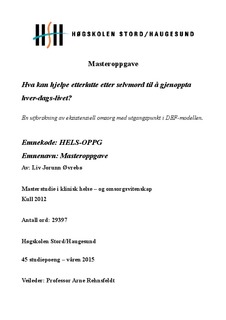| dc.description.abstract | Background and the purpose of the project
The purpose of the project was to discover concretely how health care personnel exert existential care to the bereaved after suicides. I have chosen to explore the DEF-model, based on health care scientific thinking, where ethics plays a part in every situation you are in.
The background for my research is my many years of experience with the bereaved after suicides. The literature confirms that the bereaved after suicides have needs for existential care to pick up their everyday lives and move on. However, the literature does not say much about how one exerts existential care in practice.
Method and selection
The project has a qualitative design with multistage focus group interviews- a total of four interviews. The selection consists of five psychiatric nurses employed in a field team devoted to mental health locally. During the analysis of the data, I used Lindseth and Norberg’s phenomenological, hermeneutical method of analysis.
Results
Existential care is everything you do that helps, supports and contributes to the bereaved to maintain their everyday lives, both relational and practical. The DEF-model is practical and in unison with existential care in practice. A premise for the bereaved to move on through the grief is that they accept that a suicide has in fact taken place. The conversation with the bereaved must not be freey flowing, but rather very structured. They have to grieve in their own pace, but there must be progress. The will to live contribute to coping with everyday life and the grief.
Conclusion
Knowledge and expertise about existential care is a premise for reflection with the 4
bereaved after suicides in order to promote their will to live and mastering everyday life. The DEF-model is a practical and useful tool. Everyday life is essential and must be integrated in the grief.
There is a need for further research in other municipalities, both in relation to other professions about how existential care is exerted, and whether the bereaved are pleased with the existential care that is provided.
Key words: Bereaved after suicide, grief, Health care science, existential care, everyday life, understanding of life, suffering, ethics and qualitative method. | nb_NO |
